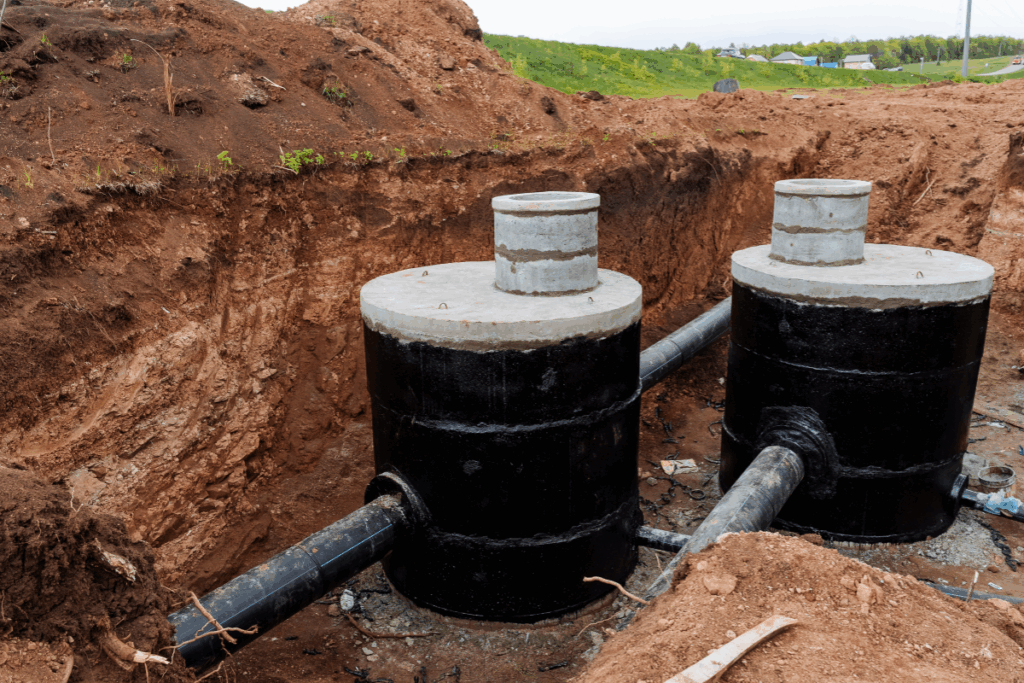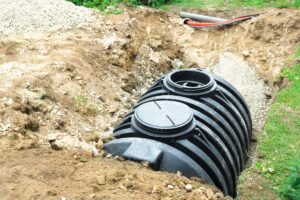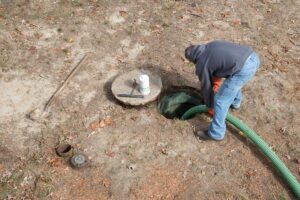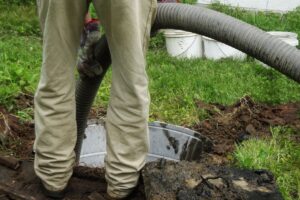When heavy rainstorms soak Eugene, Florence, Salem, or other regions of the Pacific Northwest, homeowners often focus on visible issues like flooded gutters or muddy driveways. The septic tank system’s core foundation remains at risk while heavy rain hangs in the atmosphere. Liquid water entering the soil creates excess moisture that harms septic system function and drainage performance. The existence of these dangers can cause messy backups, hazardous conditions, and long-lasting damage to your septic system. Homeowners should implement methods to protect their septic systems from water damage during rainy periods. This blog details septic stress science while warning about potential signs and effective solutions for running your septic tank system in Salem undisturbed during weather conditions.
How Heavy Rain Disrupts Your Septic System’s Balance
Your septic system is a finely tuned ecosystem. Wastewater flows from your home into the tank, where the solids settle, and bacteria break down organic matter. The liquid then moves to the drain field, filtering through the soil for final treatment. Heavy rain throws this process off course in three key ways:
1. Drain Field Flooding: The drain field relies on dry, porous soil to absorb and filter wastewater. Saturated soil from rain can’t absorb more liquid, leading to backups.
2. Groundwater Infiltration: Rising water tables during storms create hydrostatic pressure, forcing groundwater into your septic tank. This overwhelms the tank’s capacity and may push untreated sewage toward your home.
3. Soil Shifts: Prolonged rain erodes soil around the tank or drain field, destabilizing the system’s structure and potentially damaging pipes.
Understanding these risks is critical for homeowners in Eugene, Florence, or Salem, where seasonal downpours are common. A waterlogged septic tank in Eugene or Florence might struggle more due to regional soil types, while Salem’s average annual rainfall of 40 inches makes septic tank systems in Salem particularly vulnerable.
Common Problems Triggered by Excessive Rainfall
Heavy rain doesn’t just cause minor inconveniences—it can create serious septic emergencies. Here’s what to watch for:
Drain Field Failure
When the drain field floods, wastewater has nowhere to go. You might notice:
- Standing water or soggy patches near the drain field
- Foul odors resembling rotten eggs
- Slow-draining sinks or toilets
Sewage Backups
Hydrostatic pressure from groundwater can reverse the flow of wastewater, causing:
- Gurgling sounds in pipes
- Sewage backups in showers, sinks, or toilets
- Unexplained dampness around floor drains
Tank Overflows
If rainwater infiltrates the tank, it can fill it beyond capacity, leading to:
- Sewage pooling on the ground near the tank
- Unusual noises from the tank (e.g., bubbling or splashing)
In Salem, where heavy rains are frequent, unresolved issues often escalate into emergencies requiring septic services. Similarly, if backups occur, homeowners with aging systems might face urgent calls for septic repairs in Eugene.
Why Soil Saturation Is a Silent Threat
Your septic system’s efficiency hinges on the soil’s ability to absorb and filter wastewater. Here’s how oversaturation undermines that process:
- Clogged Soil Pores: Saturated soil can’t absorb effluent, causing wastewater to rise to the surface or flow backward.
- Reduced Microbial Activity: Beneficial bacteria in the tank and soil thrive in specific conditions. Excess water dilutes their effectiveness, slowing waste breakdown.
- Structural Risks: Waterlogged soil loses stability, increasing the risk of tank shifts or pipe misalignment.
In Florence, where clay-heavy soil dominates, saturation occurs faster, making septic repairs in Florence a common need after storms.
Immediate Actions to Be Taken During a Septic Emergency
If your system shows signs of stress during or after heavy rain, act quickly to minimize damage:
1. Stop All Water Use: Avoid showers, laundry, dishwashing, or flushing toilets. Every gallon adds pressure to an already overwhelmed system.
2. Check for Visible Issues: Safely inspect the tank and drain field for pooling water or odors, but avoid direct contact with sewage.
3. Contact Professionals: For emergency pumping, contact Best Septic Tank Pumping. Their team serves Eugene, Florence, Salem, and surrounding areas, offering a rapid response to prevent health hazards or environmental contamination.
4. Redirect Runoff: Use downspout extenders or regrading to steer rainwater away from the septic system.
Pro Tip: If you’re in Salem and notice recurring issues, schedule a routine inspection for your septic tank to identify vulnerabilities before the next storm.
Long-Term Strategies to Weatherproof Your Septic System
Prevention is always better than repairs. Here’s how to fortify your system against future rainfall:
Schedule Regular Pumping
Routine pumping removes sludge buildup, ensuring your tank has ample capacity to handle excess water. Best Septic Tank Pumping recommends pumping every 3–5 years, depending on household size and usage.
Protect the Drain Field
- Avoid parking vehicles or keeping heavy objects on the drain field.
- Plant grass or shallow-rooted plants to prevent soil erosion.
- Install gravel trenches or French drains to divert rainwater.
Inspect for Weaknesses
Annual inspections can spot cracks, leaks, or early signs of soil erosion. For example, homeowners in Eugene can pair septic tank maintenance with post-storm checkups to ensure their system stays resilient.
Upgrade Vulnerable Components
If your system is older, consider:
- Installing effluent filters to prevent clogs
- Adding a riser for easier access during pumping
- Replacing corroded pipes or fittings
Why Local Expertise Matters
Regional factors like soil type, water tables, and weather patterns deeply influence septic systems. For example:
- Eugene: With its mix of clay and loamy soils, the drain fields here may flood faster during storms. Regular maintenance of your septic tank in Eugene is key to avoiding backups.
- Florence: Coastal humidity and sandy soils require tailored solutions. Proactive care from Best Septic Tank Pumping can help septic tank systems withstand heavy rains.
- Salem: Higher annual rainfall means systems here work harder. Scheduling septic tank Salem pumping ahead of storm season reduces overflow risks.
Trust Best Septic Tank Pumping to Weather the Storm
Heavy rain doesn’t have to mean disaster for your septic system. By understanding how water impacts your tank and drain field—and taking proactive steps—you can avoid emergencies and extend your system’s lifespan.
If you’re in Eugene, Florence, Salem, or nearby communities, Best Septic Tank Pumping is your partner in septic care. Their team specializes in maintenance, emergency pumping, and inspections to keep your system running smoothly, rain or shine. Don’t wait until the next storm hits—take charge of your septic health today. After all, isn’t peace of mind worth protecting?









